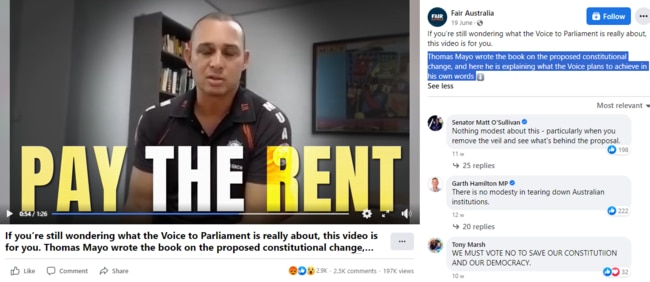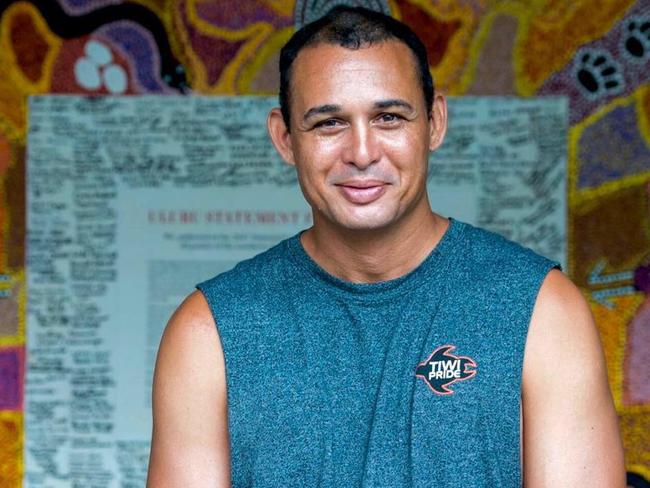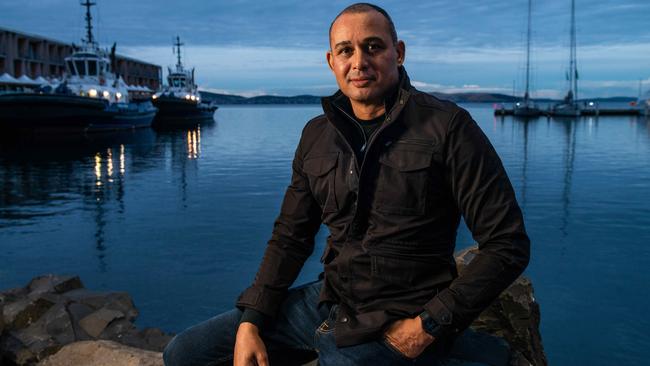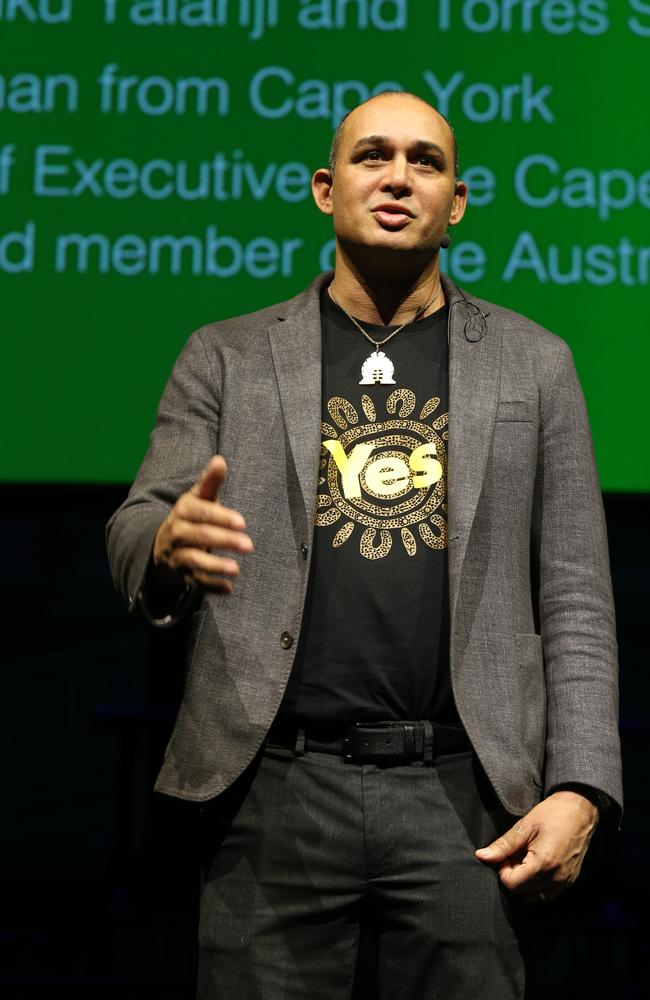The truth about Voice campaigner Thomas Mayo’s push to ‘pay the rent’
Thomas Mayo is one of the lead campaigners for the Voice and seemingly wants to take your land and make you ‘pay the rent’.
National
Don't miss out on the headlines from National. Followed categories will be added to My News.
Indigenous activist Thomas Mayo wants to secretly use the Voice to strip away land rights from ordinary Australians and force them to pay reparations to First Nations people.
That’s if you believe a series of alarming videos circulating online that stitch together fragments of his old speeches and out-of-context remarks made over several years.
One such video produced by Fair Australia, the leader of the No campaign, has been viewed more than 197,000 times on Facebook alone and attracted thousands of furious comments, including from Coalition MPs.

It selectively cuts together various clips of Mr Mayo mentioning “pay the rent”, talking about reparations and referencing communism and “tearing down institutions” with the caption “what the Voice plans to achieve in his own words”.
“It’s disappointing,” Mr Mayo said of the tactic. “It’s just blatant. The ‘no’ campaign wants to cause confusion and whip up fear among people.”
On Tuesday, a secret recording was leaked of an online training session run by the right-wing political group Advance, which runs the Fair Australia campaign.
In it, volunteers who will be tasked with calling people to convince them to vote No were told not to reveal they are working with the campaign, to ignore “facts” in favour of emotion, and to falsely claim Indigenous people will be eligible for compensation if the Voice succeeds.
“We’ve seen the tactics of their campaign come to light with that leaked recording,” Mr Mayo said.
“They’re telling No campaigners to not talk about the truth but to play on emotions of fear and confusion. Our challenge is to break through that confusion in the coming weeks.”

Mr Mayo is a lifelong advocate of Indigenous rights and was part of the original Uluru Dialogue, which saw hundreds of delegates come together to reach consensus on the Uluru Statement from the Heart in 2017.
“There was a very important formula applied to bringing together the Uluru Dialogue,” he explained.
“It was to ensure there was a cross section of perspectives and experiences, to allow space for not just those with the loudest voices but also for Indigenous people who are at the frontline of mental health, education, general health and employment.”
He then spent two years travelling around the country talking to communities about the proposals contained within the Uluru Statement, including the notion of an Indigenous Voice.
“I haven’t stopped since then,” he said.
When he speaks with news.com.au, Mr Mayo has just finished visiting maritime workers at a Melbourne wharf to talk about what the Voice is – and what it is not.
Whether in these workplace visits, during doorknocking or while handing out leaflets at train stations and shopping centres, a common theme is emerging among undecided voters.
“People are confused. They don’t know what it’s about. I think that’s really because of all the noise out there from the No camp,” he said.
“If you can present to people that this moment in time is informed by a history of Indigenous voices being silenced, a history of harmful and wasteful decisions by governments who aren’t listening to Indigenous people, and that this is an advisory committee, that there’s nothing to lose for anyone, they tend to say yes.”
He is also keen to remind undecided voters that the Voice will provide guidance on health, education and employment to those crafting policies affecting Indigenous people.
“The Voice gives advice, it cannot decide laws or where funding goes, and it cannot take anyone’s backyard or force them to pay the rent,” he said.
“That’s the fear campaign run from the No side. They’ve mashed together clips of me appearing to endorse such things in the past.
“Cut through all that noise and it’s simple – the Voice is an advisory body.”

Polling indicates the referendum is on track to be defeated, with support slipping away over recent months, but Mr Mayo said he has encountered the opposite sentiment on the ground.
“I’m seeing more people saying Yes than No,” he said. “I’m also meeting people who are undecided and looking for more information – and I think it’s a large group.”
But a tactic employed with some success by the No campaign is amplifying the dissenting voices of Indigenous Australians, he conceded.
Two of the most prominent No campaigners are former Liberal Party candidate Nyunggai Warren Mundine and Coalition Senator Jacinta Nampijinpa Price. When First Nations people speak out against the Voice, their words are quickly seized upon by Fair Australia.
“It dehumanises Indigenous people to expect us to agree 100 per cent on any reform,” Mr Mayo said. “But it’s remarkable that consistently polls have shown more than 80 per cent of support from Aboriginal and Torres Strait Islander communities.
“The No campaign understands there’s good will in the community towards Indigenous people and there’s an expectation we do something about our plight.
“People want to do the right thing. It’s a tactic of the No campaign to cause confusion and so they amplify any dissent, beyond what it is.”

Should the referendum fail, Mr Mayo said Australia will wake the next day to “more of the same”.
The gap between non-Indigenous Australians and First Nations people is wider than ever and no government, Labor nor Coalition, has succeeded in moving the needle, he said.
Whether for or against the Voice, he believes that is a situation no Australian is happy with.
“If it’s a No, it’s more of the same,” he said. “Yes is trying something different and something that’s been proven to work, which is that when decisions are made about a people, decision makers should listen to them first.”
Originally published as The truth about Voice campaigner Thomas Mayo’s push to ‘pay the rent’


